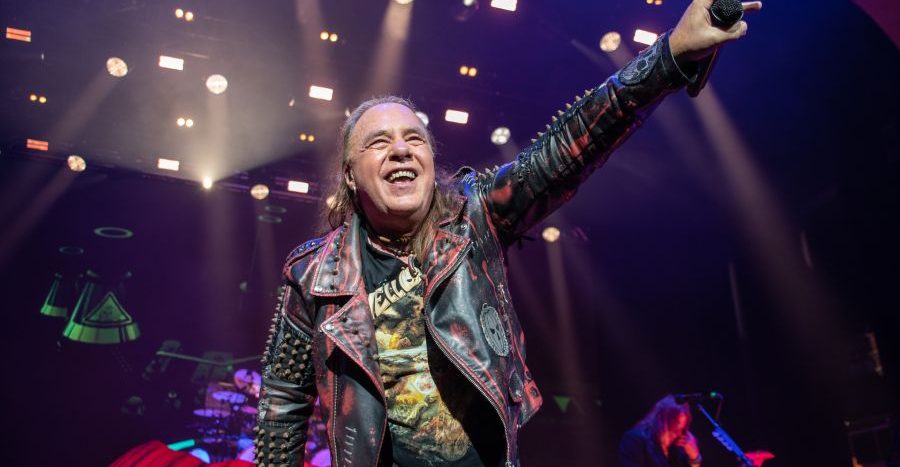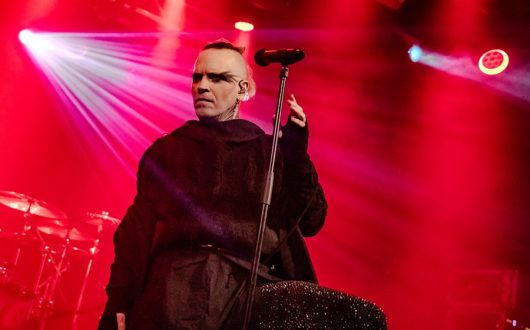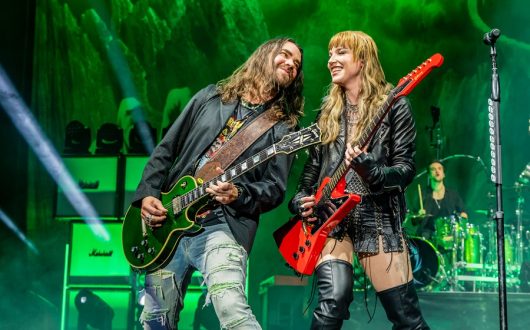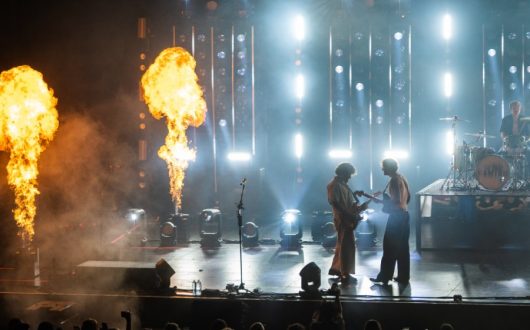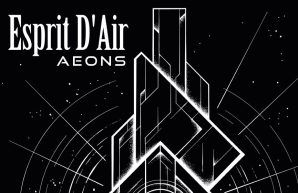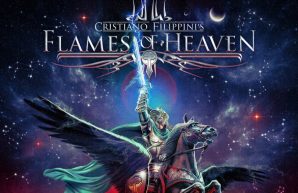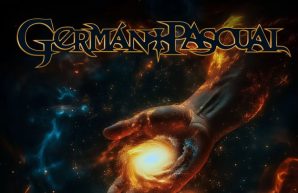Interview and Pictures: Adrian Hextall / MindHex Media
Thirty years ago, the metal world watched as Helloween, Germany’s power metal pioneers, faced a seismic shift. Michael Kiske, the voice that defined their legendary ‘Keeper of the Seven Keys’ albums, was out. In stepped Andi Deris, frontman of the hard rock outfit Pink Cream 69. Deris wasn’t just filling shoes; he was tasked with navigating the band through metal’s lean grunge years and keeping the pumpkin flame alive. Fast forward through two decades of solid albums and unwavering fan loyalty, and the unthinkable happened: the ‘Pumpkins United’ reunion, bringing Kiske and founding guitarist/vocalist Kai Hansen back into the fold alongside Deris and the established lineup.
It was a move fraught with peril. Would egos clash? Would the chemistry work? Could they top their already considerable success? As Adrian Hextall discovered during a candid chat with Andi Deris, the reunion wasn’t just a calculated risk; it was a necessary evolution, a testament to mutual respect, and perhaps, the ultimate key to Helloween’s enduring legacy.
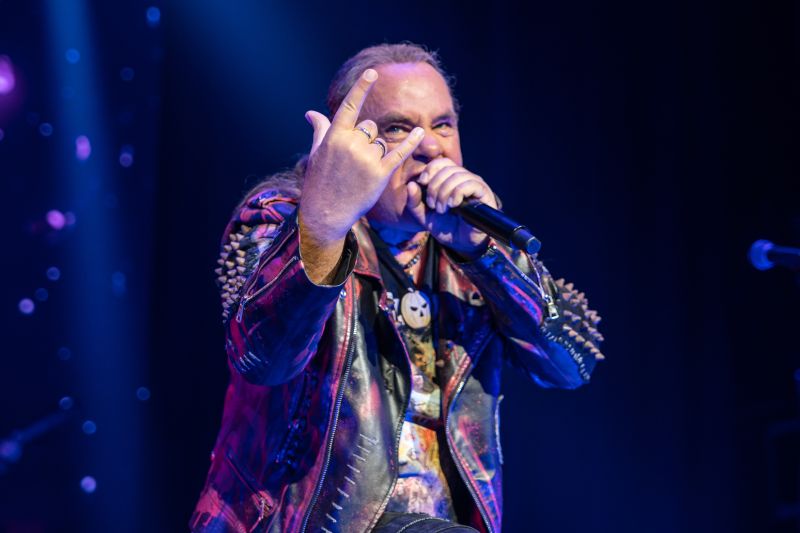
The idea of a Helloween reunion wasn’t born overnight. It had simmered for years, nudged along by industry figures and the undeniable logic that time waits for no one. “It was actually born in Japan,” Deris recalls, crediting the boss of JVC, Sego. “He actually came up… [and said] ‘You should do some reunion’. He actually talked about everybody who was in the band so far which would be 12… that would have been stupid in my eyes.”
The focus quickly narrowed. “We shrunk it down to the most important people,” Deris states firmly. “That would definitely be Kai [Hansen] and Kiske.” Kai Hansen, the band’s founder, had already rejoined the orbit, touring with Helloween alongside his own band, Gamma Ray. But Kiske, the voice many fans still yearned for, was the wild card.
Deris admits the prospect was nerve-wracking. He’d helmed Helloween for over two decades, steering them to a Number 1 album in Germany and Top 10s across the globe just before the reunion talks intensified. This wasn’t a band limping towards a cash-grab reunion; they were arguably at a creative peak. “How do you top that even?” Deris mused. “The best argument was, look, we had just a number one album… That’s the right time. Nobody would say, ‘Oh, it’s a sell-out’.”
Still, the fear lingered. “Honestly, not only nervous, I was more than nervous,” Deris confesses. “It’s a very critical thing to do… critical in the sense of it could destroy your career. Because it’s really Helloween… what if the old guys come in and destroy everything…?” The internal band politics were also a concern. “It was a hard fight to actually get Weiki [guitarist Michael Weikath] to acknowledge that it would be the time to make this reunion. Now or Never… because we’re not getting any younger.”
The key, they decided, was to test the waters before committing to anything permanent, especially an album. “We always said, ‘Oh, slow it down…’ because first, we have to see if we got along with each other. If we hit ourselves on stage like Van Halen did… there’s no future. It would have been a sell-out, put it that way.”
The initial tour dates were the crucible. “I was so nervous because I thought, ‘Okay, are we doing the right thing or are we destroying now everything?'” Deris reflects. “If we get along with them, it’ll be definitely up only. If we don’t get along with them, maybe it just trusts the band completely, yeah, forever.”
The relief came quickly. “I would say after three shows, there was that pivot point that I was not nervous anymore,” he says with a smile. The dreaded ego clash simply didn’t materialize. Particularly crucial was the relationship between the two frontmen. “I realised Kiske… you had to trust me. We had some great time… he visited me on my island in Tenerife… he fell in love with the island, I fell in love with him, and the rest is history, kinda. It was actually dream come true. It worked.”
Deris attributes the smooth integration partly to maturity and mutual respect. “He did not look at me like ‘that bloody singer who robbed my job’ because I didn’t. He’d already left. And vice versa, I didn’t look at him like, ‘Ah, you are now the main head of the band…’ Maybe because I was old enough? I don’t know. But that ego shit did not appear, not one second. And that’s very rare.”
A crucial element was Deris offering Kiske a safety net. “I always told him… ‘Whenever you don’t feel good or whenever you feel like ‘I can’t sing it’, ask me. I know the lyrics…’. He did that twice… Andi, can you help out?’ ‘No problem.’ So I sang the song. And that gave him this confidence… He always was scared he couldn’t do the job.” Kiske, having been away from the Helloween machine for so long, understandably had anxieties. “I would have been scared to death as well in his situation,” Deris empathizes.
This dynamic created a unique “brutal luxury” on stage. Instead of one frontman carrying a two-to-three-hour power metal show, the load could be shared. “We’re talking about power metal, it’s not like singing classic rock,” Deris points out. “Can we do it together? Yes, we can. We can do it already in the rehearsal room, saying ‘Hey Michael, I’m completely hooked up after that song… you do a song from you.’ Relax, and then I’m off we go again. Who benefits? The fans, everybody!”
This collaborative spirit extended naturally into the studio for the self-titled 2021 album, Helloween. There was no pressure for either singer to mimic the other. “Speaking for Michael,” Deris explains, “he is definitely one of those guys who sings… ‘I’m never gonna sing like that. It’s not me…’ Let Andi sing it or Kai sing it. He’s very honest.” Deris, conversely, was happy not to have to imitate Kiske anymore, a pressure he faced early in his Helloween tenure. “Everybody wanted me to copy Michael… No, I’m not going to do that. I’m gonna sing Michael songs the way I can and want to sing them.”
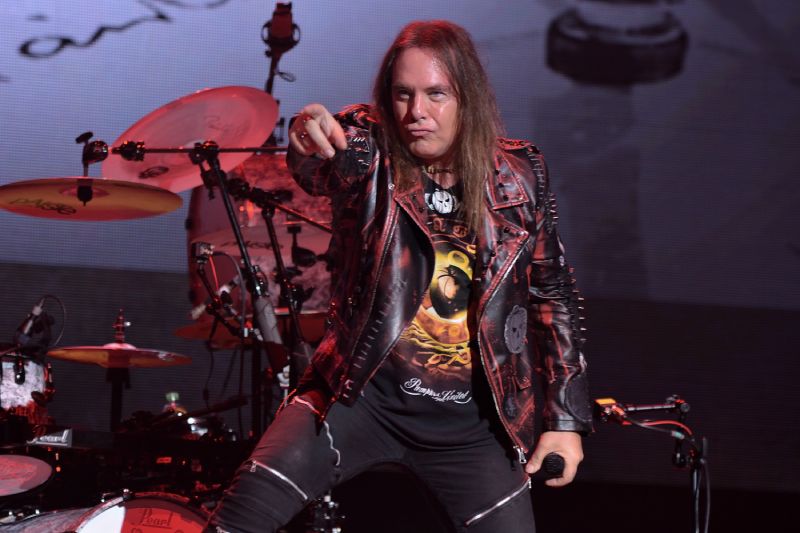
Now, fans get the best of both worlds: Kiske singing his classics, Deris singing his, and both tackling each other’s material or duetting. “When Michael sings [one of my songs], it sounds fucking good as well, but not the way you’re grown up on,” Deris acknowledges. “It gives us something new to hear… listen to it in a different way.” Kai Hansen, having fronted Gamma Ray for years, also steps up, adding a third vocal dimension, although Deris chuckles, “If you ask him, no… he actually says he’s not capable of singing longer than half an hour and his voice is gone.”
Deris describes their vocal approaches: Kai is pure rock ‘n’ roll abandon (“singing out of the stomach… don’t give a f*”**), Kiske is all technique, and Deris himself sits somewhere in between, needing to balance power with preservation. This blend, this “luxury,” allows them to manage the demands of lengthy shows, even covering for each other during illness. “If you’re sick, I can take over a little bit,” Deris explains. “If I am fucked up, you can take over… and the people have the time of their lives anyway.” Though he admits singing a whole show without Kiske now feels daunting: “All the responsibility and all the stress… on my shoulders again.”
The conversation touches on Helloween’s enduring popularity, particularly in Japan, a market that remained loyal even when metal dipped elsewhere. This loyalty inspired the track “Best Time” (originally conceived as “This is Tokyo” ) on the latest album. “Since over 30 years I wanted to write a song about it,” Deris shares. “Japan always gave us the possibility to go on… Whenever other markets in the world went down, Japan was always there.” He contrasts this with the “brutal waves” and media-driven trends in other regions that saw genres like hard rock decline while metal, somehow, persisted.
Deris expresses bewilderment at fleeting trends, recalling the pressure his former bandmates in Pink Cream 69 felt during the grunge era. “They wanted to go on the grunge train… [saying] ‘You want to force me… to write Alice in Chains? Are you fucking serious?’ I couldn’t understand the world anymore.” Helloween, meanwhile, stuck to their guns, releasing Master of the Rings in 1994 against the prevailing tide and achieving massive success. “We were strong enough to say, ‘Fuck it, yeah, and do what we do’.”
This resilience, Deris believes, is key. He credits the strong partnership he formed with guitarist Michael Weikath upon joining Helloween. “We knew ourselves since ’86, ’87… years before I actually joined,” he notes. This pre-existing trust and shared vision provided stability. “Together, we always had the argument… There was this trust… that the both of us decide the right thing.”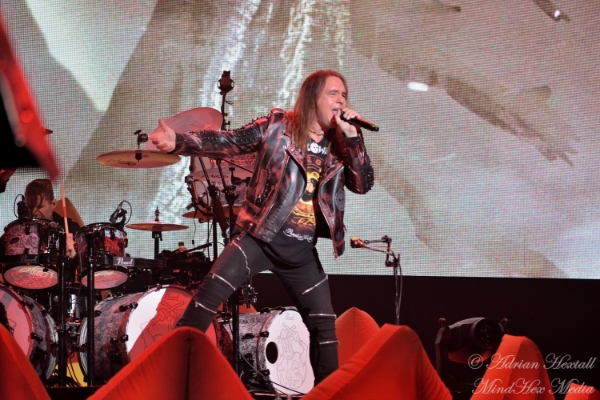
Joining Helloween lifted a massive weight off Deris’s shoulders. In Pink Cream 69, despite founding the band and writing the songs, the pressure was immense and unrewarding. His demos, rejected by his Pink Cream bandmates who wanted to chase trends, were embraced by Helloween. “I remember Marcus [Grosskopf, bassist]… when he listened to my demos, he was like… blown away. I said, ‘Okay, who’s my best now?’ The band that I just [am] about to leave who hated the songs… or [Helloween]… They were happy, they were like ‘Wow!’ Decision was easy then. So much pressure falling off my shoulders when I joined the band.”
The biggest lesson learned over his decades in Helloween? “Coming from where I came from as the only songwriter… my biggest lesson was there are other songwriters… on the planet… that do as good a job as you do. Building up trust… it’s not only me. It makes life so much easier because suddenly you may share… it takes away so much pressure.”
Looking ahead, sharing the load isn’t just a convenience; it’s a strategy for longevity. “I don’t know if I would have been able to do a show… when I’m 65, 70… solo frontman? Probably not.” The Pumpkins United lineup isn’t just a nostalgia act; it’s a sustainable model for the future, ensuring the Helloween legacy continues, powered by multiple voices, shared responsibility, and a healthy dose of mutual respect – washed down, perhaps, with a fine Islay whisky on a Saturday night. The pumpkins, it seems, are united for the long haul.
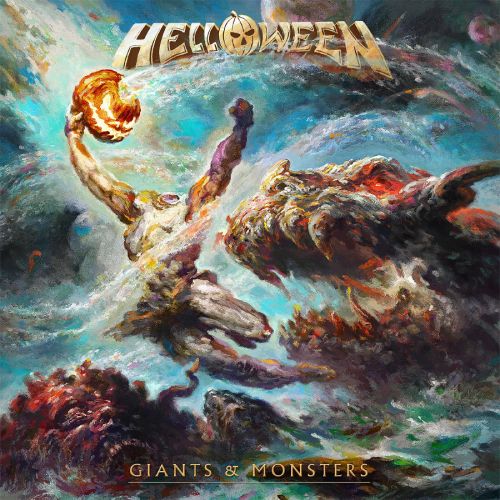
Helloween – Giants & Monsters
Reigning Phoenix
Release: 29 August 2025
Tracklist:
1. Giants On The Run
2. Saviour Of The World
3. A Little Is A Little Too Much
4. We Can Be Gods
5. Into The Sun
6. This Is Tokyo
7. Universe (Gravity For Hearts)
8. Hand Of God
9. Under The Moonlight
10. Majestic
Band Members:
Michael Kiske – vocals
Andi Deris – vocals
Kai Hansen – guitars, vocals
Michael Weikath – guitars
Sascha Gerstner – guitars
Markus Grosskopf – bass
Daniel Löble – drums
Website | Facebook | Instagram | Threads | TikTok | YouTube | X | Spotify | Apple Music
